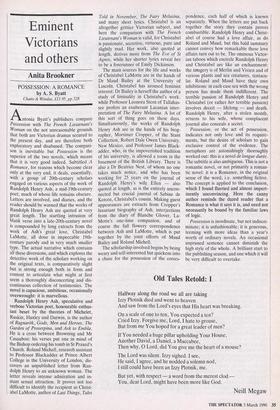Eminent Victorians and others
Anita Brookner
POSSESSION: A ROMANCE by A. S. Byatt
Chatto &Windus, £13.95, pp.528
Antonia Byatt's publishers compare Possession with The French Lieutenant's Woman on the not unreasonable grounds that both are Victorian dramas secured to the present day, and are therefore both exploratory and disabused. The compari- son is inevitable but Possession is the superior of the two novels, which means that it is very good indeed. Subtitled A Romance, for reasons which become clear only at the very end, it deals, essentially, With a group of 20th-century scholars engaged on various aspects of the work of Randolph Henry Ash, a mid-19th-century poet, much of whose life remains obscure. Letters are involved, and diaries, and the reader should be warned that the works of Randolph Henry Ash are quoted at very great length. The startling intrusion of blank verse into a late-20th-century novel is compounded by long extracts from the work of Ash's great love, Christabel LaMotte, all done in impeccable 19th- century parody and in very much smaller type. The actual narrative which contains all these diversions, and which explores the detective work of the scholars working on the original texts, is comparatively slight but is strong enough both in form and content to articulate what might at first seem a thoroughly disconcerting and dis- continuous collection of testimonies. The novel is capacious, ambitious, occasionally overwrought: it is marvellous.
Randolph Henry Ash, speculative and verbose Victorian poet, honourable enthus- iast beset by the theories of Michelet, Ruskin, Huxley and Darwin, is the author of Ragnareik, Gods, Men and Heroes, The Garden of Proserpina, and Ask to Embla. He is a cross between Browning and Mr Casaubon: his verses put one in mind of the Bishop ordering his tomb in St Praxed's Church. Roland Michell, research assistant to Professor Blackadder at Prince Albert College in the University of London, dis- covers an unpublished letter from Ran- dolph Henry to an unknown woman. The letter reveals intense admiration and in- stant sexual attraction. It proves not too difficult to identify the recipient as Christ- abel LaMotte, author of Last Things, Tales Told in November, The Fairy Melusina, and many short lyrics. Christabel is an altogether grittier Victorian subject, and here the comparison with The French Lieutenant's Woman is valid, for Christabel is passionate, secretive, virtuous, pure and slightly mad. Her work, also quoted at length, derives more from The Eve of St Agnes, while her shorter lyrics reveal her to be a forerunner of Emily Dickinson.
The main sources for the life and works of Christabel LaMotte are in the hands of Dr Maud Bailey at the University of Lincoln. Christabel has aroused feminist interest: Dr Bailey is herself the author of a study of liminality in Christabel's work, while Professor Leonora Stern of Tallahas- see profers an exuberant Lacanian inter- pretation of The Fairy Melusina. A lot of this sort of thing goes on these days. Simultaneously, the works of Randolph Henry Ash are in the hands of his biog- rapher, Mortimer Cropper, of the Stant Collection, Robert Dale Owen University, New Mexico, and Professor James Black- adder, who, in the impoverished tradition of his university, is allowed a room in the basement of the British Library. There is also a Dr Beatrice Nest, of whom no one takes much notice, and who has been working for 25 years on the journal of Randolph Henry's wife Ellen — also quoted at length, as is the entirely uncon- nected but crucial journal of Sabine de Kercoz, Christabel's cousin. Making guest appearances are extracts from Cropper's luxuriant biography of Ash, interjections from the diary of Blanche Glover, La- Motte's one-time companion, and of course the full flowery correspondence between Ash and LaMotte, which is put together by the joint efforts of Maud Bailey and Roland Michell.
The scholarship involved begins by being weary and self-interested but quickens into a chase for the possession of the cones- pondence, each half of which is known separately. When the letters are put back together the story they contain proves combustible. Randolph Henry and Christ- abel of course had a love affair, as do Roland and Maud, but this bald summary cannot convey how remarkable these love affairs turn out to be. The ominous Victor- ian taboos which encircle Randolph Henry and Christabel are like an enchantment: the imagery is of Merlin and Vivien and of various plants and sea creatures, tentacu- lar. Roland and Maud have their own inhibitions: in each case sex with the wrong person has made them indifferent. The terrible passion of Randolph Henry and Christabel (or rather her terrible passion) involves deceit — lifelong — and death. Randolph Henry, after a stolen month, returns to his wife, whose complacent journal also conceals a secret.
Possession, or the act of possession, indicates not only love and its require- ments, but the desire of scholars to gain exclusive control of the evidence. The metaphors are astonishingly thoroughly worked out: this is a novel de longue duree. The subtitle is also ambiguous. This is not a romantic novel, or not primarily a roman- tic novel: it is a Romance, in the original sense of the word, i.e. something fictive. The concept is applied to the conclusion, which I found flurried and almost impert- inently unconvincing. Here the canny author reminds the dazed reader that a Romance is what it says it is, and need not necessarily be bound by the familiar laws of logic.
Possession is inordinate, but not indiscri- minate; it is unfashionable; it is generous, teeming with more ideas than a year's worth of ordinary novels. An occasional unpruned sentence cannot diminish the high style of the whole. A brilliant start to the publishing season, and one which it will be very difficult to overtake.


























































 Previous page
Previous page